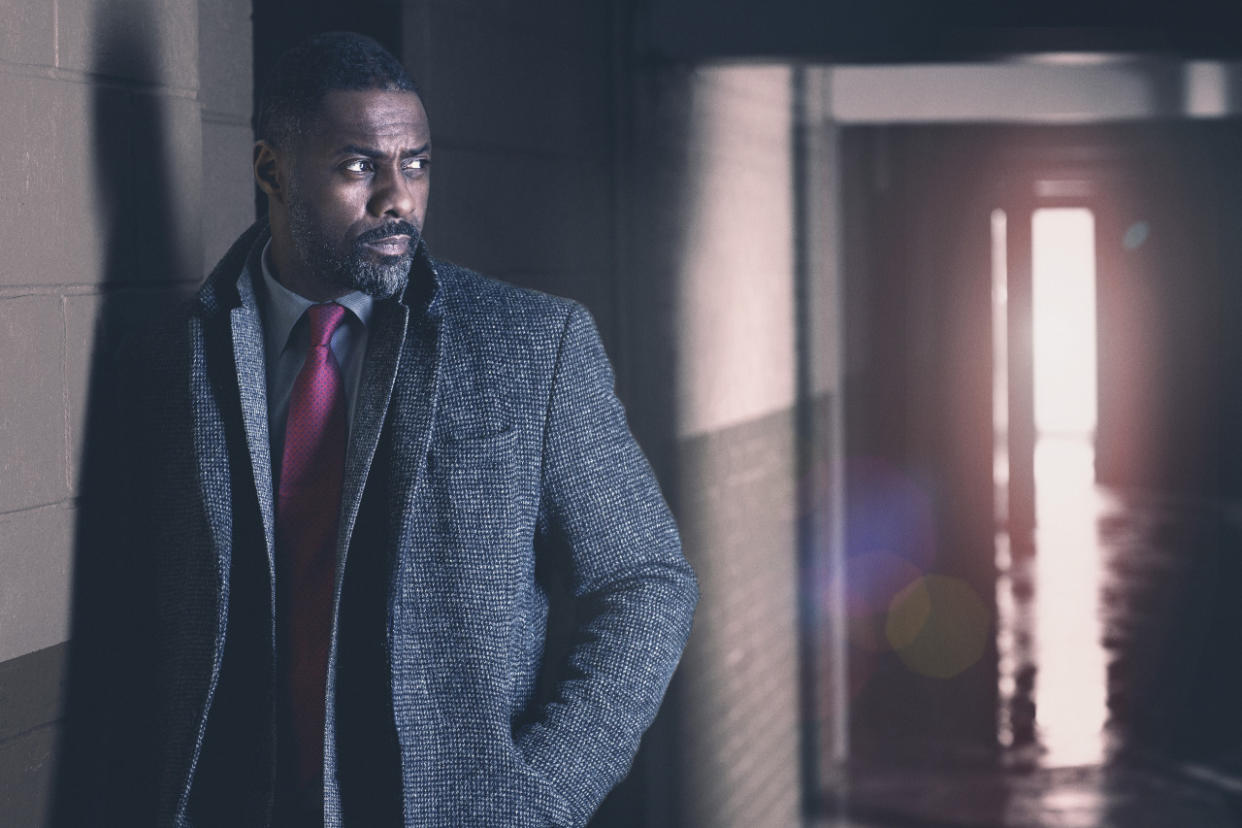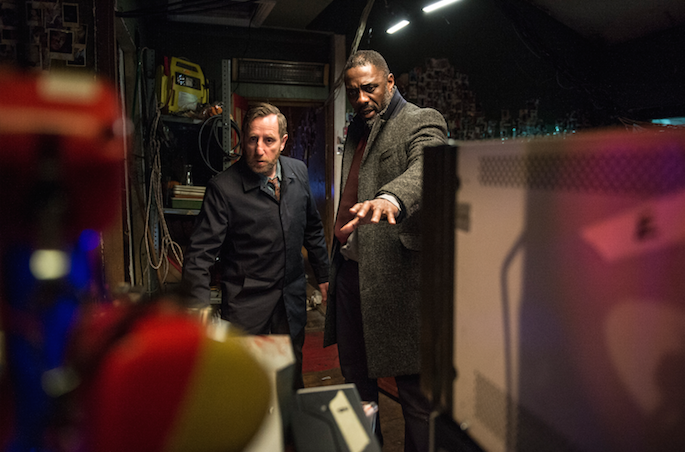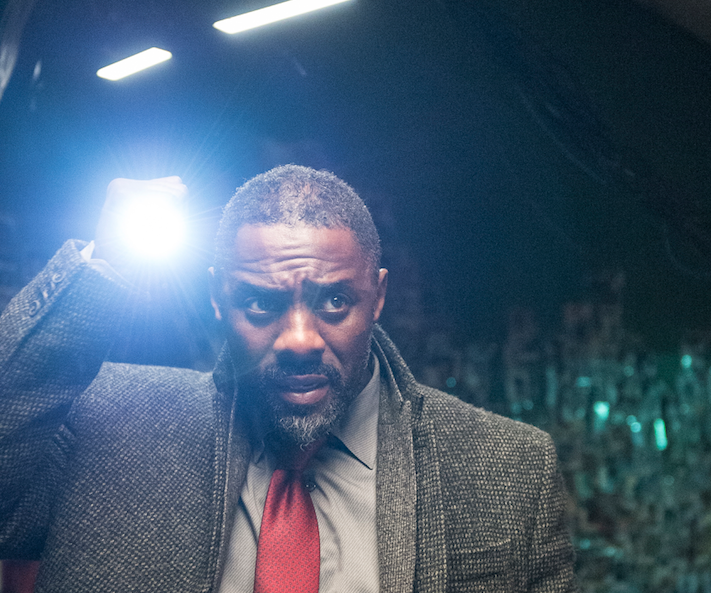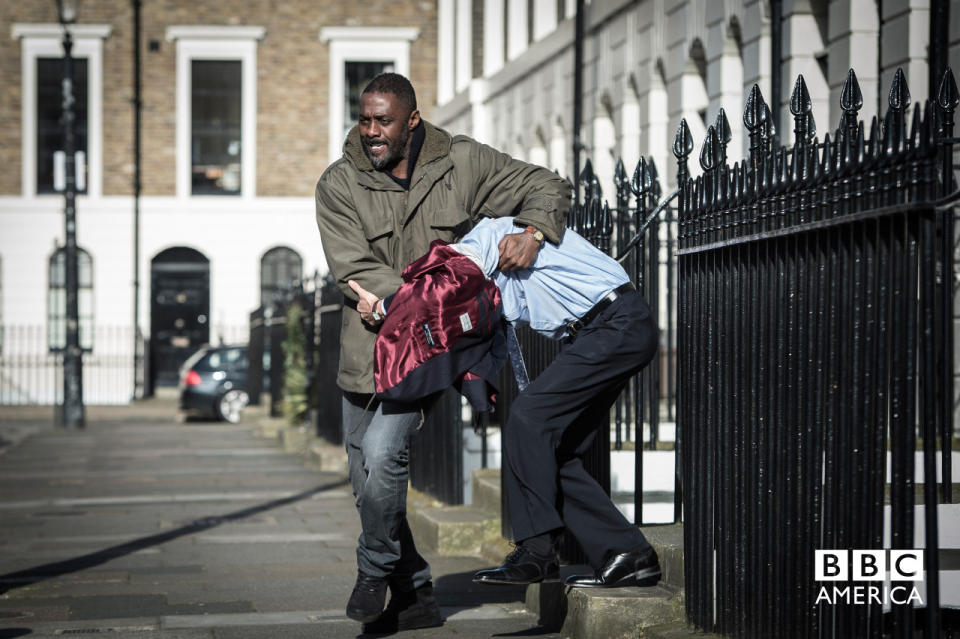Idris Elba on the Return of 'Luther,' His Ongoing Therapy Sessions

If the best gifts come in the smallest parcels, then the new season of BBC America’s Luther is already your favorite Christmas present. Idris Elba’s grizzly bear of a detective returns for one night, Dec. 17, on the trail of another unhinged serial killer. Unlike the previous three seasons, which have numbered six, then four episodes, this is one shot and that’s your lot.
“I know we don’t do as many as the audience would like,” says Elba in that two bourbons-and-a-bag-of-grit voice that viewers first came to know in The Wire. “But [Luther creator/writer Neil Cross] and I had a very small window, so we thought rather than do nothing let’s just do something special. We thought if we’re only going to do two hours, we had to raise the stakes.”
Related: Idris Elba Explains Why Luther is His Bond (and a Fictional Hero for Today’s Real World)
The extended special (which actually runs 165 minutes, with commercials) begins with Luther holed up in a small holiday cottage on England’s idyllic south coast, his tweed coat nowhere to be seen, his trademark silver Volvo mothballed.
“We wanted to know what would he look like and feel like outside of the mean streets of London,” Elba says. “That’s all part of maturing the character a bit. There’s been a time gap, but how long we don’t really say. But things have moved on. And then, of course, the phone rings, and it’s all downhill from there.”
Luther’s rustication doesn’t last long. Dragged back to East London, two plotlines uncoil. One involves Luther’s longtime muse and nemesis, Alice (Ruth Wilson). Is she alive? “Her presence is felt,” Elba says with a smile. The other story introduces a new psychopath to the series’ canon of pasty grotesques, this one with a lust for malware, voyeurism, and human flesh.
“Worse than ever? Yeah. This character’s particularly gruesome, odd, and gnarly. Smart. He’s a little unexpected,” Elba says. “Neil has outdone himself with this one.”
But all anyone really wants to know is what about Luther’s coat? The last time we saw it, he’d just thrown it off Southwark Bridge.
“When we first see John there’s no coat,” Elba says, before confessing in the face of pictures already released that yeah, the coat makes a comeback. “Look, John Luther just won’t sleep. He just can’t keep still. As long as there’s someone out there trying to get away with murder he’s going to try and chase them. He’s like a cat with a red dot. He just can’t stop that feeling of wanting to right some wrongs.”

Luther has always been a mix of bluff urban realism with a swish of baroque. In its set pieces, usually involving an intricate, protracted murder, it has given viewers several of the most memorable pieces of television they’d really rather forget — an exercise in knuckle-gnawing suspense. But this special is different — it cracks along, recasting John Luther as a man of action as much as a tortured soul. That’s no accident; the thinning down of Luther from six episodes in Season 1, to four in Seasons 2 and 3, and now to this one-off, has been carefully calibrated.
“It was part of this attempt to get the audience to think about it not just as a series but maybe as a commodity that goes on,” Elba says.
He’s talking, of course, about the long-mooted Luther movie. It’s been Elba who’s been doing most of the mooting.
“Everyone talks to me about Bond,” says the actor who’s been touted as the next James Bond for almost as long as he’s been famous. “We love Bond, and then he gets taken in to all these different scenarios. With the film version of Luther, there’s a similar principle. You just want to make his world bigger and give a slightly larger scale to the whole thing.”
Might we, for example, learn a little bit more about his backstory? About what goes on inside his mind?
“Yeah, but you might not want to,” Elba says. “There was a sequence in this season that we did, a very dark, deep sequence, that explained some things that were floating around in Luther’s head. We shot it, cut it, and put it in — and had to take it out. It was a psychological expression of John. The audience would have gone, ‘I wanted to get to know him, but Jesus, really?’ It was deep,” he says. “To be honest, not everything we write and shoot we can put on TV. Me? I loved it. It was the powers that be who said, ‘No.’”

What’s going on in John’s head is, it may or may not surprise you to learn, not a million miles away from what’s going on in Idris’s head.
“Do you know what? I always go to Luther when I’m my most grumpiest. I’m feeling s–t? Let’s play some Luther. It is a really tough show to make, mentally. But actually, I use John Luther as a little bit of a therapy session for me because there’s lots of screaming and shouting, and I would prefer to do it on camera than in real life,” he says. “People say, ‘That’s really good acting!’ It wasn’t acting. I was really angry. It is definitely therapy. I use it as a cathartic experience.”
You might think that with a career in which he receives two Golden Globe nominations in the same year — first for Luther and Mandela: Long Walk to Freedom in 2013, and now for Luther and Beasts of No Nation — Elba would have little need for therapy. But he says that he has still not recovered from the death of his father two years ago.
“I’ve still not mourned about that — it’s hard to do,” he says. “Actors have real lives, and the truth is not everything is as rosy as it might seem when you read about them. I’ve got a character of my own that I apply to the character of John Luther. I don’t shy away from that. I had a very rough time before we did that first season of Luther. That door kicking scene? We only had to do it once. [Director] Bryan Kirk was like, ‘Er, okay, guys, everyone take five. Let’s clear the room.’”
The upside of Luther as Elba’s therapy? Treatment is ongoing.
“I do want to keep playing John in some way, shape, or form. Because I’m really attached to it, and I probably won’t ever get another character [like him]. It’s the one project where, when I show up on set, all I have to do really is put on the costume. Other characters, I put on accents and walks and assume different things. With John Luther, I shoot it in Hackney [in East London, where Elba grew up] in my own accent. I can be closer to me. My grey beard is my grey beard. And Neil now just knows what I sound like and writes with my voice in his head.”

So there will be more Luther. It’s just a question of how it will be delivered. Elba doesn’t want to bore the audience — “After five or six years of any television show people go, ‘Really? We’re here again?’” — but he needs to keep himself interested, too.
“I would get bored if I had to keep churning out 12 episodes. I couldn’t do that any more. Secretly I’ve been imagining Luther on stage. As crazy as that might sound, why not? It’s a great character, and it could be a very small detailed version of it that lives on stage.”
The mind boggles. Luther the Musical? Springtime for Psychos? Alice in Lutherland?
There’s that gruff laugh again: “Nah. That ain’t gonna happen.”
The Luther special premieres Dec. 17 at 9 p.m. on BBC America.

